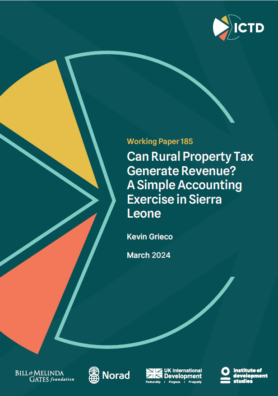Working Paper 185
How should governments in sub-Saharan Africa boost their own-source revenue? In this research note I explore the decision of policymakers to expand property taxation into rural areas in the context of developing countries. A policymaker weighing the costs and benefits of rural taxation must first consider the potential net revenue that can be extracted from rural areas. Ultimately, this is an empirical question that requires reliable data on the costs and potential revenue associated with rural taxation. Unfortunately, little such reliable data exists.
In this project, I seek to fill this gap by measuring village-level costs and potential revenue associated with property taxation in Kono District in rural Sierra Leone. Based on a set of simulations, I find that property tax in poor, sparsely-populated rural areas can generate positive net revenue. While these gains are modest, they can provide a meaningful source of local government revenue in a context where incomes are near the bottom of the global distribution, and where there are potentially large returns to government spending.
These simulations also highlight several features of rural tax collection. First, to increase net revenue, policymakers should prioritise increasing compliance over reducing collection costs. Second, I show that much of the revenue generated from rural taxation is likely to come from a small subset of the total villages. Third, I highlight several trade-offs between salary-based and pay-for-performance (PFP) models of tax collector compensation. I conclude by situating these results in policymakers’ broader calculus for taxing rural areas.
